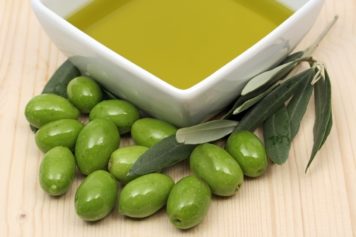
According to WomensHealth.gov, about half of all African-American have cholesterol levels that are too high. A gene called MTP also causes high cholesterol in African-American men under the age of 40. Eating lots of high-fat foods and being inactive are also factors that contribute to raised cholesterol levels in the Black community overall.
In general, a healthy, balanced diet filled with lots of fresh vegetables and fruit can contribute to your overall well-being and help your body fight off disease. However, there are some specific foods that are especially helpful when it comes to maintaining healthy cholesterol levels. Here are a few foods you can start incorporating into your diet today.
Olive Oil (and olive products)
Olive oil is a great source of vitamin E and monounsaturated fat. According to research, foods that are high in monounsaturated fat can lower LDL or “bad” cholesterol and increase HDL, which is the “good” cholesterol. Raising HDL and decreasing the amount of LDL cholesterol in your body is essential if you suffer from high cholesterol, and most products made from olive will help with this. To add olive products to your diet, use a teaspoon or two of olive oil (mixed with a little lemon juice and black pepper) as a salad dressing, or prepare your foods in olive oil each day. Eating olives in salads or as a snack, or using margarine made with olive oil can also help you to get or maintain healthy cholesterol levels.
Legumes
Legumes include foods like beans, lentils peas and soy products. These ingredients can be dry, cooked or canned and are good for your heart and cholesterol levels due to their high fiber content. Legumes also have nutrients that protect the heart, along with B vitamins and phytonutrients. The high fiber in these foods can also lower your energy intake, so your body won’t have to work as hard to burn off the fat. Legumes also have a low glycemic index to keep your blood sugar intact. According to the South African Food-based Dietary Guidelines, we should eat legumes on a regular basis—about four times a week.
Fat Free Dairy Products
Full-fat dairy, as well as most cheeses, have a high amount of saturated fat, so you should avoid them if you have high cholesterol or want to keep your levels down. However, you can still incorporate some dairy into your diet. If you eliminate dairy altogether, you could be depriving your body of calcium, which is essential for the heart to function. When you take the fat out of milk products, virtually all the cholesterol is removed. Fat free milk and yogurt are healthy additions to a low cholesterol diet. These fat-free foods are also high in protein and probiotics, which is ideal for digestive health. If you’re dairy-free, yogurts made from coconut or almond milk provides calcium and probiotics as well.
Polyunsaturated and Flora “pro-activ” Margarine
Instead of butter, try using soft margarine that comes in a tub. This ingredient has a high polyunsaturated fat content to help lower your LDL cholesterol. These margarines are considered ‘lite’ and have less fat and salt than traditional margarines, which is also important for heart health.
Fruits and Vegetables
Finally, it’s important to eat lots of fresh produce, since vegetables and fruits are high in antioxidants. In particular, fresh foods that are rich in vitamin C and beta carotene. Fruits that are high in vitamin C like berries, mango and guava are ideal for a low-cholesterol diet. All the vegetables in the cabbage family, which includes cabbage, broccoli and Brussels sprouts, are high in vitamin C as well. These foods also help to strengthen your immune system and improve blood circulation.
Foods with beta carotene like pumpkin, carrots and sweet potatoes are essential for heart health and the increase of “good” cholesterol in the body. All leafy green vegetables are also high in beta carotene, so including collard greens, spinach and cabbage into your diet can lower your cholesterol significantly as well.
To ensure that these foods are in your diet on a regular basis, planning your meals ahead of time and using a variety of spices and herbs to flavor your food can make your diet more interesting. This, along with a healthy exercise program, can help you keep high cholesterol at bay.
